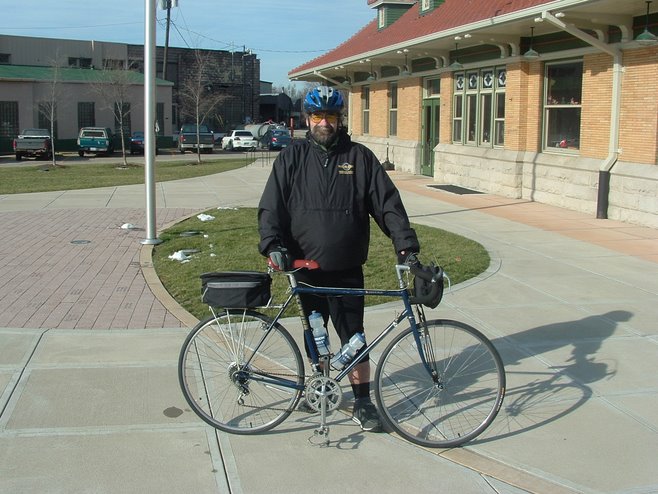Aerobic Exercise and Memory
It's official, exercise improves memory and cognitive function. In a study done at Duke University, the effects of exercise (Hard aerobic exercise to VO2 Max levels) were studied by James A Blumenthal and David J Madden. Blumenthal is with the Department of Psychiatry at Duke and Madden is with the Center for the Study of Aging and Human Development. Essentially, while your general ability to recall are unaffected, the ability to search your memory are significantly improved. This means that while you can't learn faster or better, you can utilize what you already have in your memory better. This persists into old age, by the way, so it boils down to the idea that if you want to remember things later in life, then exercise now. It appears to improve your ability to recall in later stages of your development.The study used 28 men of ages ranging from 30-58 years of age. There were two groups, one exercising anaerobically, the other using aerobic exercise. All subjects were free of cardiovascular disease. The mean ages of both groups were statistically congruent at +/- 8-9 years approximately.
Psychological and physiological testing was completed on all subjects twice during the study, the first at 1 week preceding the study and the second testing battery after 12 weeks of exercise. VO2 max was the standard used to determining the aerobic level of the exercise over the 12 week period on the physiological end. The VO2 Max of each group was comparatively studied statistically during the testing and there was no significant variance. The end result was that after the testing batteries, the subjects experienced a marked increase in the ability to memory search.
Cycling, now, to tie this into my general blog topic is both an aerobic and anaerobic exercise, depending on the intensity of the riding involved. If you exercise the body, you also exercise the mind. Another interesting side effect of the exercise was a greater capacity for the synaptic gap to manage seratonin reuptake. This shows in a reduction of symptoms of depression, although this may be an effect of the endorphin release brought on by intense exercise. What it comes down to, to put it in simple terms is that if you ride your bike (exercise), not only does your outlook improve, but you can also remember more clearly as far as what you've learned already! Walking also has this physiological effect as does other forms of exercise, such as strength training or running or swimming.
©2006- Tom Stormcrowe (Pseudonym) Creative Commons- Some rights reserved
Title:Effects of Aerobic Exercise Training, Age, and Physical Fitness on Memory-Search PerformanceAuthor(s):Blumenthal, James A., Department of Psychiatry, Duke University Medical Center
Madden, David J., Center for the Study of Aging and Human Development, Duke University Medical CenterSource:Psychology and Aging, Vol. 3(3), September 1988. pp. 280-285. Publisher:American Psychological AssociationISSN:0882-7974Digital Object ID:10.1037/0882-7974.3.3.280 Article Type:Journal ArticleAbstract:We investigated the effects of exercise training on memory performance. One group of 13 men (M = 42.92 years of age) participated in supervised aerobic exercise (jogging) three times a week for 12 weeks. A second group of 15 men (M = 43.67 years of age) performed anaerobic exercise (strength training) for the same period of time. Subjects' reaction time (RT) performance in a memory-search task was assessed both before (Time 1) and after (Time 2) the 12 weeks of exercise training. Results indicated that there was no significant change in memory-search performance over time as a function of exercise training. Analyses of the Time 2 RTs demonstrated that aspects of memory-search performance were related significantly both to subjects' initial (Time 1) level of fitness and to age, but not to the amount of change in fitness associated with aerobic exercise training over this 12-week duration in this age group.Accession Number:pag33280Persistent link to this record:http://search.epnet.com.allstate.libproxy.ivytech.edu/login.aspx?direct=true&db=pdh&an=pag33280Database: PsycARTICLES
References
1. Anders, R. T., Fozard, J. L. & Lillyquist, T. D. (1972). Effects of age upon retrieval from short-term memory. Developmental Psychology, 6, 214-217.
2. Balke, B. & Ware, R. W. (1959). An experimental study of physical fitness of Air Force personnel. U.S. Armed Forces Medical Journal, 10, 675-688.
3. Berger, B. G. & Owen, D. R. (1983). Mood alteration with swimming: Swimmers really do “feel better.” Psychosomatic Medicine, 45, 425-433.
4. Blumenthal, J. A., Emery, C. F., Cox, D. R., Walsh, M. A., Kuhn, C. M., Williams, R. B. & Williams, R. S. (1988). Exercise training in healthy Type A middle-aged men: Effects on behavioral and cardiovascular responses. Psychosomatic Medicine, 50, 418-433.
5. Blumenthal, J. A. & McCubbin, J. A. (1987). Physical exercise as stress management. In A. Baum & J. Singer (Eds.), The handbook of psychology and health (pp. 303–331). New York: Erlbaum.
6. Blumenthal, J. A., Williams, R. S., Needles, T. L. & Wallace, A. G. (1982). Psychological changes accompany aerobic exercise in healthy middle-aged adults. Psychosomatic Medicine, 44, 529-536.
7. Botwinick, J. E. & Storandt, M. (1974). Cardiovascular status, depressive affect, and other factors in reaction time. Journal of Gerontology, 29, 543-548.
8. Botwinick, J. E. & Thompson, L. W. (1968). Age differences in reaction time: An artifact? Gerontologist, 8, 25-28.
9. Cerella, J., Poon, L. W. & Williams, D. M. (1980). Age and the complexity hypothesis. In L. W. Poon (Ed.), Aging in the 1980s: Psychological issues (pp. 332–340). Washington, DC: American Psychological Association.
10. Clarkson, P. M. & Kroll, W. (1978). Practice effects on fractionated response time related to age and activity level. Journal of Motor Behavior, 10, 275-286.
11. Cunningham, D. A., Rechnitzer, P. A., Howard, J. H. & Donner, A. P. (1987). Exercise training of men at retirement: A clinical trial. Journal of Gerontology, 42, 17-23.
12. Dustman, R. E., Ruhling, R. O., Russell, E. M., Shearer, D. E., Bonekat, H. W., Shigeoka, J. W., Wood, J. S. & Bradford, D. C. (1984). Aerobic exercise training and improved neuropsychological function of older individuals. Neurobiology of Aging, 5, 35-42.
13. Elsayed, M., Ismail, A. H. & Young, R. J. (1980). Intellectual differences of adult men related to age and physical fitness before and after an exercise program. Journal of Gerontology, 35, 383-387.
14. Folkins, C. H. & Sime, W. E. (1981). Physical fitness training and mental health. American Psychologist, 36, 373-389.
15. Hanson, J. S. & Neede, U. H. (1974). Long-term physical training effect in sedentary females. Journal of Applied Physiology, 32, 112-116.
16. Hilyer, J. C. & Mitchell, W. (1979). Effect of systematic physical fitness training combined with counseling on the self-concept of college students. Journal of Counseling Psychology, 26, 427-436.
17. Hughes, J. R. (1984). Psychological effects of habitual aerobic exercise: A critical review. Preventive Medicine, 13, 66-78.
18. Hurley, B. F., Seals, D. R., Ehsani, A. A., Cartier, L.-J., Dalsky, G. P., Hagberg, J. M. & Hoolszy, J. O. (1984). Effects of high-intensity strength training on cardiovascular function. Medicine and Science in Sports and Exercise, 16, 483-488.
19. Plude, D. J., Kaye, D. B., Hoyer, W. J., Post, T. A., Saynisch, M. J. & Hahn, M. V. (1983). Aging and visual search under consistent and varied mapping. Developmental Psychology, 19, 508-512.
20. Rikli, R. & Busch, S. (1986). Motor performance of women as a function of age and physical activity level. Journal of Gerontology, 41, 645-649.
21. Sherwood, A., Light, K. C. & Blumenthal, J. A. (1987). Aerobic exercise reduces blood pressure response to mental stress in borderline hypertensive men. Manuscript submitted for publication.
22. Simons, A. D., McGowan, C. R., Epstein, L. H., Kupfer, D. J. & Robertson, R. J. (1985). Exercise as a treatment for depression: An update. Clinical Psychology Review, 5, 553-568.
23. Spirduso, W. W. (1975). Reaction and movement time as a function of age and physical activity level. Journal of Gerontology, 30, 435-440.
24. Spirduso, W. W. (1980). Physical fitness, aging, and psychomotor speed: A review. Journal of Gerontology, 35, 850-865.
25. Spirduso, W. W. & Clifford, P. (1978). Neuromuscular speed and consistency of performance as a function of age, physical activity level and type of physical activity. Journal of Gerontology, 33, 26-30.
26. Sternberg, S. (1969). Memory-scanning: Mental processes revealed by reaction-time experiments. American Scientist, 57, 421-457.
27. Thomas, S. G., Cunningham, D. A., Rechnitzer, P. A., Donner, A. P. & Howard, J. H. (1985). Determinants of the training response in elderly men. Medicine and Science in Sports and Science, 17, 667-672.
28. Tomporowski, P. D. & Ellis, N. R. (1986). Effects of exercise on cognitive processes: A review. Psychological Bulletin, 99, 338-346.



4 comments:
I was going to post about this, but I forgot about it.
Are you following the Tour at all? I'm not normally into following sporting events that closely, but the 2006 Tour is absolutely stunningly amazing.
Yes, I am and am thoroughly enjoying it! WOOHOO!
Today's stage didn't have too many surpises, but overall this race has been one for the history books. I was rooting for Leipheimer today in the breakaway, but oh well.
Tom,
Thanks for stopping by. I just posted some storm aftermath pix over on the blog... check it!
Post a Comment